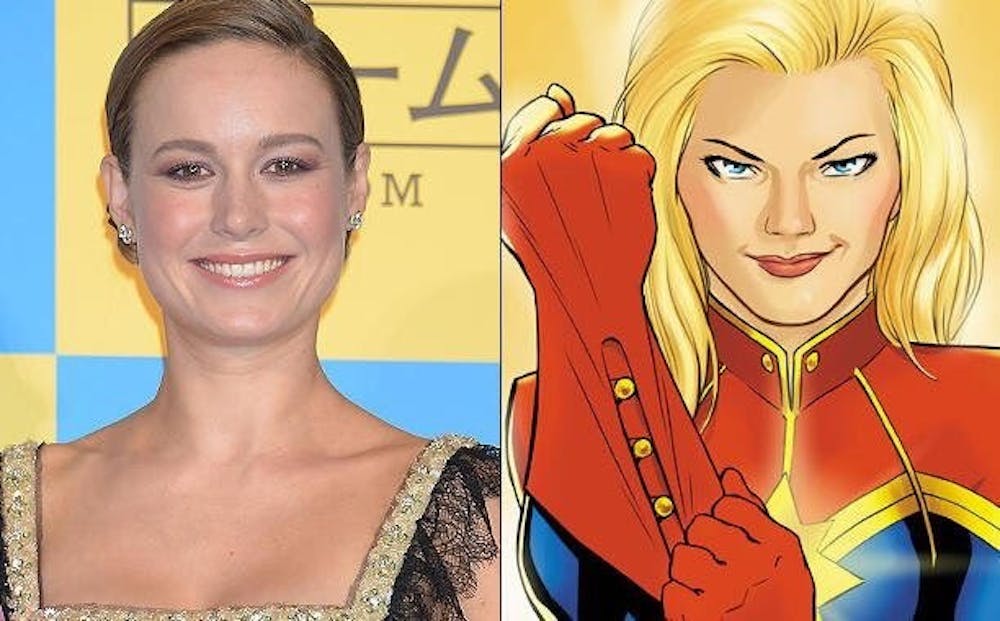Marvel’s first female superhero origin story is finally here: Brie Larson stars as extraterrestrial Kree warrior fighting a war between her people and the evil, shape shifting Skrull people. All the while, she struggles with keeping her emotions in check at the direction of her Kree comander, Yon–Rogg (Jude Law), and working through recurring snippets of her past life that she can’t quite piece together. After a mission goes bad, she finds herself on Earth in 1995, where she meets future SHIELD director, Nick Fury (Samuel L. Jackson) and enlists his help to end the war with the Skrulls. She eventually uncovers her true identity as U.S. air force pilot Carol Danvers and realizes her true power to become Captain Marvel.
Captain Marvel is an important milestone in Marvel history. But that doesn't mean it's perfect. Here's why Captain Marvel is a promising Marvel prototype that can be improved on in future female–led productions.
Let's start with Brie Larson. As Captain Marvel, she’s cool, clever, and powerful. Her effortless wit is charming and her get–shit–done attitude is energizing. But Carol Danvers' character and backstory is undeveloped and flat. As an amnesiac, Carol struggles for the majority of the movie to remember her past, and we only get short glimpses of her as a child and her relationship with her father. I awaited a scene or two that'd delve deeper into Carol's past (this is, after all, an origin story) but nothing about her origination is ever revealed beyond these flashbacks.
As for Carol's relationship with side characters, the most notable is with Nick Fury, pre–eye–patch. Their unlikely friendship and playful banter were reminiscent of a buddy cop film and was almost as endearing as Fury’s attachment to an adorable tabby cat in the film named Goose. I can appreciate this type of humor (it’s a staple of Marvel films), but there were some scenes, funny as they were, that felt a little too much like "Fury and Goose featuring Carol on the side." It wasn’t until the introduction of Maria Rambeau, Carol’s best friend and a badass fighter pilot, that we get a chance to see more of Carol’s personality and her capacity for love, loyalty, and support.
The absence of a love interest, however, was refreshing and satisfying as the film followed Carol through her journey of self–discovery and realization. The revelation of Carol's true enemy—Yon–Rogg, her commanding officer who, while pretending to be her friend and mentor, lies and manipulates Carol to prevent her from realizing her full potential—was a compelling and relevant allegory for gaslighting.
Set in 1995, this film did a great job of turning back the clock with references to Blockbuster, grunge fashion, and The Fresh Prince of Bel–Air. Marvel also excelled in the music department with a killer 90’s soundtrack featuring classic bands like Nirvana, TLC, Salt–N–Pepa, and No Doubt. Cue the nostalgia.
Captain Marvel was also a great prelude to the upcoming and highly anticipated Avengers: Endgame. As the most powerful Avenger and superhero in the Marvel Universe, Captain Marvel is prophesied to be the universe’s saving grace from super villain, Thanos. This film simultaneously answers enough questions presented in Avengers: Infinity War and drops enough hints and teasers to create hype ahead of the April 26 release of Avengers: Endgame.
At the end of the day, Captain Marvel is decent. I didn’t love it as much as I wanted to and you probably won't either. But I’ve concluded that my lack of fulfillment is due to the film’s prototypical nature and the exceedingly high expectations I set for it as the first Marvel film of its kind. As a woman, I wanted so badly to finally see myself in Carol Danvers, and the notion of a film based on an ultra–powerful female hero was exciting. But the actual execution of her character didn’t leave me awestruck. The formulaic writing, characteristic of all Marvel movies, was underwhelming here because I felt a groundbreaking movie like this one deserved a revamped version of the trusty Marvel formula.
But with all that said, I’d still go to the theater to see it a second time. As viewers and (especially female) Marvel fans, we should support and appreciate a milestone movie like Captain Marvel for the much—needed diversity and inclusion it brings to the table. At the same time, we should also be able to constructively criticize its flaws while calling for the continuation and improvement of a diverse Marvel Universe in the future.

